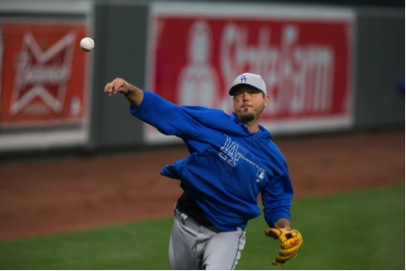A marketing campaign is only as good as its social media exposure, and sometimes things can go wrong quickly. That’s especially true on today’s Internet, and it’s a lesson Domino’s Pizza (NYSE: DPZ) just learned the hard way.
As a result of Josh Beckett’s recent no-hitter with the L.A. Dodgers, the company gave away 20,000 free pizzas this week. The contest, although cleverly branded as “#DomiNoNo” on Twitter (NYSE: TWTR), ultimately backfired after fans experienced order delays and widespread confusion.
The background
The campaign was originally announced at the beginning of the 2013 baseball season. In partnership with MLB Advanced Media, Domino’s offered free pan pizzas to the first 10,000 MLB.TV subscribers who registered on its website after the first two no-hitters of that season. Completed without any major hitches, both contests were over in about two hours, The Wall Street Journal reports.
The company renewed the sponsorship for an undisclosed amount of money this year, doubling the number of freebies and opening it up to all MLB.com users in the process. After Beckett’s nine-inning, no-hit performance on Sunday, Domino’s likely expected to gain more Twitter clout. It has more than 500,000 followers on the social media site.
ALSO READ: Major League Baseball Rivalries Cause Ticket Price Surge
What went wrong?
That’s not what happened, though. As Fox Sports reports, the MLB AM and Domino’s site “couldn’t handle all the traffic, and some people were left pizza-less.” The contest was trending on Twitter, which led to a number of unfortunate “#DomiNoNo” puns.
User @DaveStawasz wrote, “Oops. Looks like MLB and Dominos are throwing their own no hitter,” while @Elamma767 joked, “You have to forgive @dominos for the #dominono server failure. They aren’t used to people WANTING their pizza.” Even ESPN’s Darren Rovell chimed in, calling it a “nightmare” for Domino’s brand.
It’s unknown exactly what caused the issue, though a server crash is the likely culprit. And although Domino’s issued a half-apology after the kinks were worked out, the damage was already done. Sentiment140, which tracks Twitter sentiment, estimates almost half of all user interactions with the hashtag were negative.
Bad social media can be costly
There have been plenty of others. The New York Police Department’s “#myNYPD” campaign, created in April to promote its positive interactions with local citizens, went south after a barrage of tweets focused on police brutality. Qantas’ “#QantasLuxury” contest, which launched during a labor dispute a few years ago, is another example. The NRA’s infamous “shooters” tweet after the 2012 Aurora shooting was equally as ill-timed.
Put simply, social media fails happen with regularity, and that probably won’t change any time soon. But what do they actually cost the companies involved?
This is up for debate. Convergys, for example, estimates that on average, a negative post can cause about 30 customers to stop using a product. Given that: (a) at least several thousand people were adversely affected by Domino’s latest campaign, and (b) the average pizza customer is worth about $100 a year per industry estimates, the company’s theoretical loss could be in the millions.
Of course, the real figure may be higher or lower depending on the number of people who now have an unfavorable opinion of Domino’s. The company did manage the backlash relatively well, and it’s worth noting Twitter sentiment improved as the technical glitches were fixed. Still, the fact that “#DomiNoNo” was trending indicates the issue received a fair share of eyeballs before it was resolved.
The bottom line
Assuming Domino’s manages its next no-hitter giveaway smoothly, it might avoid any permanent damages to its reputation. But it is time for companies to understand the importance of intelligent social media marketing, and the risks associated with failure. Whether it’s pizza or police, every promotional opportunity comes with a price if sentiment turns sour.
100 Million Americans Are Missing This Crucial Retirement Tool
The thought of burdening your family with a financial disaster is most Americans’ nightmare. However, recent studies show that over 100 million Americans still don’t have proper life insurance in the event they pass away.
Life insurance can bring peace of mind – ensuring your loved ones are safeguarded against unforeseen expenses and debts. With premiums often lower than expected and a variety of plans tailored to different life stages and health conditions, securing a policy is more accessible than ever.
A quick, no-obligation quote can provide valuable insight into what’s available and what might best suit your family’s needs. Life insurance is a simple step you can take today to help secure peace of mind for your loved ones tomorrow.
Click here to learn how to get a quote in just a few minutes.
Thank you for reading! Have some feedback for us?
Contact the 24/7 Wall St. editorial team.

